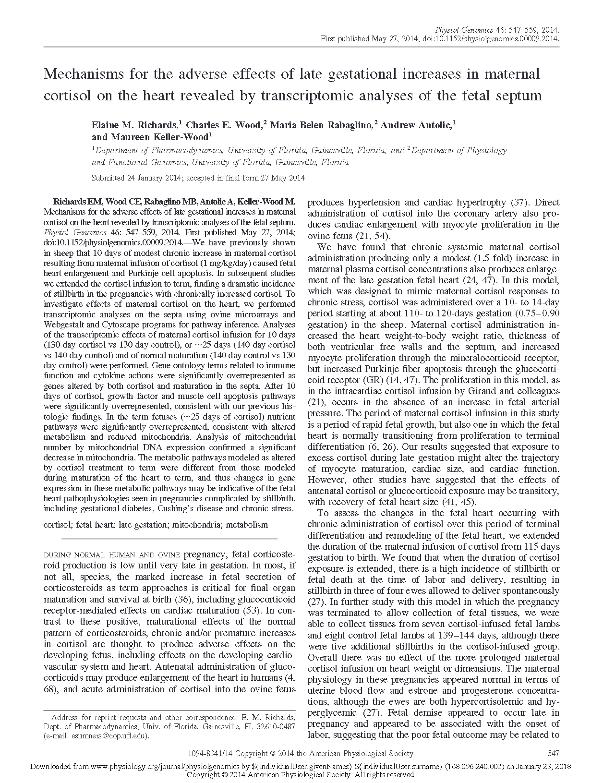Mostrar el registro sencillo del ítem
dc.contributor.author
Richards, Elaine
dc.contributor.author
Wood, Charles
dc.contributor.author
Rabaglino, Maria Belen

dc.contributor.author
Antolic, Andrew
dc.contributor.author
Keller Wood, Maureen
dc.date.available
2018-01-23T14:28:24Z
dc.date.issued
2014-05
dc.identifier.citation
Richards, Elaine; Wood, Charles; Rabaglino, Maria Belen; Antolic, Andrew; Keller Wood, Maureen; Mechanisms for the adverse effects of late gestational increases in maternal cortisol on the heart revealed by transcriptomic analyses of the fetal septum; American Physiological Society; Physiological Genomics; 46; 15; 5-2014; 547-559
dc.identifier.issn
1094-8341
dc.identifier.uri
http://hdl.handle.net/11336/34253
dc.description.abstract
We have previously shown in sheep that 10 days of modest chronic increase in maternal cortisol resulting from maternal infusion of cortisol (1 mg/kg/d) caused fetal heart enlargement and Purkinje cell apoptosis. In subsequent studies we extended the cortisol infusion to term, finding a dramatic incidence of stillbirth in the pregnancies with chronically increased cortisol. To investigate effects of maternal cortisol on the heart, transcriptomic analyses were performed on the septa using ovine microarrays and Webgestalt and Cytoscape programs for pathway inference. Analyses of the transcriptomic effects of maternal cortisol infusion for 10days (130d-cortisol vs 130d-control), or ~25 days (140d-cortisol vs 140d-control) and of normal maturation (140d-control vs 130d- control) were performed. Gene ontology terms related to immune function and cytokine actions were significantly overrepresented as genes altered by both cortisol and maturation in the septa. After 10 days of cortisol, growth factor and muscle cell apoptosis pathways were significantly overrepresented, consistent with our previous histologic findings. In the term fetuses ( ~25 days of cortisol) nutrient pathways were significantly overrepresented, consistent with altered metabolism and reduced mitochondria. Analysis of mitochondrial number by mitochondrial DNA expression confirmed a significant decrease in mitochondria. The metabolic pathways modeled as altered by cortisol treatment to term were different from those modeled during maturation of the heart to term, and thus changes in gene expression in these metabolic pathways may be indicative of the fetal heart pathophysiologies seen in pregnancies complicated by stillbirth, including gestational diabetes, Cushing´s disease and chronic stress.
dc.format
application/pdf
dc.language.iso
eng
dc.publisher
American Physiological Society

dc.rights
info:eu-repo/semantics/openAccess
dc.rights.uri
https://creativecommons.org/licenses/by-nc-sa/2.5/ar/
dc.subject
Cortisol
dc.subject
Fetal Heart
dc.subject
Late Gestation
dc.subject
Metabolism
dc.subject
Mitochondria
dc.subject.classification
Otras Ciencias Biológicas

dc.subject.classification
Ciencias Biológicas

dc.subject.classification
CIENCIAS NATURALES Y EXACTAS

dc.title
Mechanisms for the adverse effects of late gestational increases in maternal cortisol on the heart revealed by transcriptomic analyses of the fetal septum
dc.type
info:eu-repo/semantics/article
dc.type
info:ar-repo/semantics/artículo
dc.type
info:eu-repo/semantics/publishedVersion
dc.date.updated
2018-01-22T14:17:13Z
dc.journal.volume
46
dc.journal.number
15
dc.journal.pagination
547-559
dc.journal.pais
Estados Unidos

dc.journal.ciudad
Bethesda
dc.description.fil
Fil: Richards, Elaine. University of Florida; Estados Unidos
dc.description.fil
Fil: Wood, Charles. University of Florida; Estados Unidos
dc.description.fil
Fil: Rabaglino, Maria Belen. Consejo Nacional de Investigaciones Científicas y Técnicas; Argentina. University of Florida; Estados Unidos
dc.description.fil
Fil: Antolic, Andrew. University of Florida; Estados Unidos
dc.description.fil
Fil: Keller Wood, Maureen. University of Florida; Estados Unidos
dc.journal.title
Physiological Genomics

dc.relation.alternativeid
info:eu-repo/semantics/altIdentifier/url/http://www.physiology.org/doi/10.1152/physiolgenomics.00009.2014
dc.relation.alternativeid
info:eu-repo/semantics/altIdentifier/doi/http://dx.doi.org/10.1152/physiolgenomics.00009.2014
Archivos asociados
